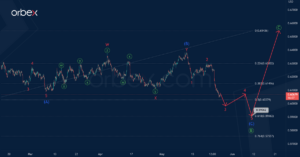Over the last week, Chinese authorities have taken a series of measures to prop up the economy. That could be seen initially as a good sign for the global economy and commodity prices. But if the economy is doing well, then it typically doesn’t need extraordinary measures of support. Which could indicate a more long-term worry, and ultimately hurt commodities as well as their respective currencies.
There were a lot of hopes pinned on China’s post-covid recovery. The initial thought was that the draconian measures implemented last year by China to control the spread of the virus had depressed the economy. The first sign of trouble was when Q4 GDP came in not as bad as expected.
The good news is isn’t good in the long run
But if the economy hadn’t been depressed as much, it means that there was less pent-up demand for a rebound. Q1 saw China’s economy returning to growth, but not as much as anticipated. Since then, preliminary measures for Q2 have soured, with PMIs returning contraction. The massive rebound hasn’t materialized, and China’s domestic economy is once again sputtering.
Some analysts remain optimistic that the rebound might still come, and is being simply delayed by global worries. But that view does not appear to be shared by the PBOC, which recently cut the reserve requirement ratio (RRR) and major lending facility (MLF) in a bid to prop up the economy. This is equivalent in effect to an interest rate cut in other economies, and implies that China’s central bank is not the least bit worried about the economy overheating.
Where to from here?
Further signs of the weak domestic situation is that the Chinese government has announced new measures to spur consumer demand. That includes offering incentives to buy cars and household appliances. With the housing market still on shaky footing, Chinese consumers are hesitant to open their pocketbooks. Even if industrial production and exports remain steady and the people still have jobs, the reluctance to spend could keep the economy depressed.
The Chinese government’s efforts to boost the domestic economy means that the consumer sector is taking a bigger role in growth. Chinese consumers are notoriously frugal, with China having among the highest personal savings rates in the world. This puts a crimp on expecting outsized growth in the economy based on domestic consumer demand.
The weaker yuan and global growth
The weakness in the Chinese currency might help reactivate the export-driven industrial base, thanks to being more competitive. By extension, it could even help reduce global inflationary pressures, and contribute to less monetary tightening. In the medium term, that might help avoid a deeper recession.
But, for the moment, Chinese firms have less purchasing power on the global scene and could be less willing to pay for commodities. This even includes crude, which could lead to a reversion in the latest CAD strength thanks to the BOC’s surprise action. Unless the government’s drive to support the domestic economy starts to bear fruits, commodity currencies could be under pressure through the summer.
Test your strategy on how the CNY will fare with Orbex
- SEO Powered Content & PR Distribution. Get Amplified Today.
- EVM Finance. Unified Interface for Decentralized Finance. Access Here.
- Quantum Media Group. IR/PR Amplified. Access Here.
- PlatoAiStream. Web3 Data Intelligence. Knowledge Amplified. Access Here.
- Source: https://www.orbex.com/blog/en/2023/06/the-end-of-chinas-recovery
- :has
- :is
- :not
- $UP
- 90
- a
- About
- Action
- again
- among
- an
- Analysts
- and
- announced
- Anticipated
- appear
- appliances
- ARE
- AS
- Authorities
- avoid
- Bad
- Bank
- base
- based
- BE
- Bear
- been
- being
- bid
- bigger
- Bit
- Blog
- boost
- but
- buy
- by
- CAD
- came
- cars
- central
- Central Bank
- China
- Chinas
- chinese
- come
- Commodities
- commodity
- commodity prices
- competitive
- consumer
- Consumers
- contraction
- contribute
- control
- could
- crude
- currencies
- Currency
- Cut
- deeper
- Delayed
- Demand
- does
- Doesn’t
- doing
- Domestic
- drive
- economies
- economy
- effect
- efforts
- end
- Equivalent
- Ether (ETH)
- Even
- expected
- expecting
- exports
- extension
- extraordinary
- Facility
- firms
- First
- For
- forex
- Forex Trading
- from
- Fruits
- GDP
- Global
- Global economy
- good
- Government
- Growth
- had
- Have
- having
- help
- here
- Hesitant
- highest
- hopes
- household
- housing
- housing market
- How
- HTTPS
- Hurt
- if
- image
- implemented
- in
- In other
- Incentives
- includes
- indicate
- industrial
- Industrial Production
- Inflationary
- Inflationary pressures
- initial
- initially
- interest
- INTEREST RATE
- IT
- Jobs
- Keep
- Last
- Last Year
- latest
- lead
- least
- lending
- less
- live
- Long
- long-term
- Lot
- major
- Market
- massive
- Masterclass
- means
- measures
- medium
- might
- MLF
- moment
- Monetary
- monetary tightening
- more
- much
- Need
- New
- news
- of
- offering
- on
- once
- open
- Optimistic
- Other
- Pay
- PBOC
- People
- personal
- plato
- Plato Data Intelligence
- PlatoData
- power
- pressure
- Prices
- Production
- purchasing
- Puts
- Q1
- Q2
- Rate
- Rates
- ratio
- rebound
- recently
- recession
- recovery
- reduce
- reluctance
- remain
- requirement
- Reserve
- respective
- returning
- Role
- s
- Savings
- saw
- scene
- sector
- seen
- Series
- shared
- sign
- Signs
- simply
- since
- situation
- spend
- spread
- starts
- steady
- Still
- Strategy
- strength
- summer
- support
- surprise
- taken
- taking
- term
- thanks
- that
- The
- the world
- their
- then
- There.
- this
- thought
- Through
- tightening
- to
- Trading
- trouble
- typically
- Ultimately
- under
- URL
- View
- virus
- was
- weakness
- webp
- week
- WELL
- were
- when
- which
- will
- willing
- with
- world
- worried
- worry
- X
- year
- Your
- Yuan
- zephyrnet













